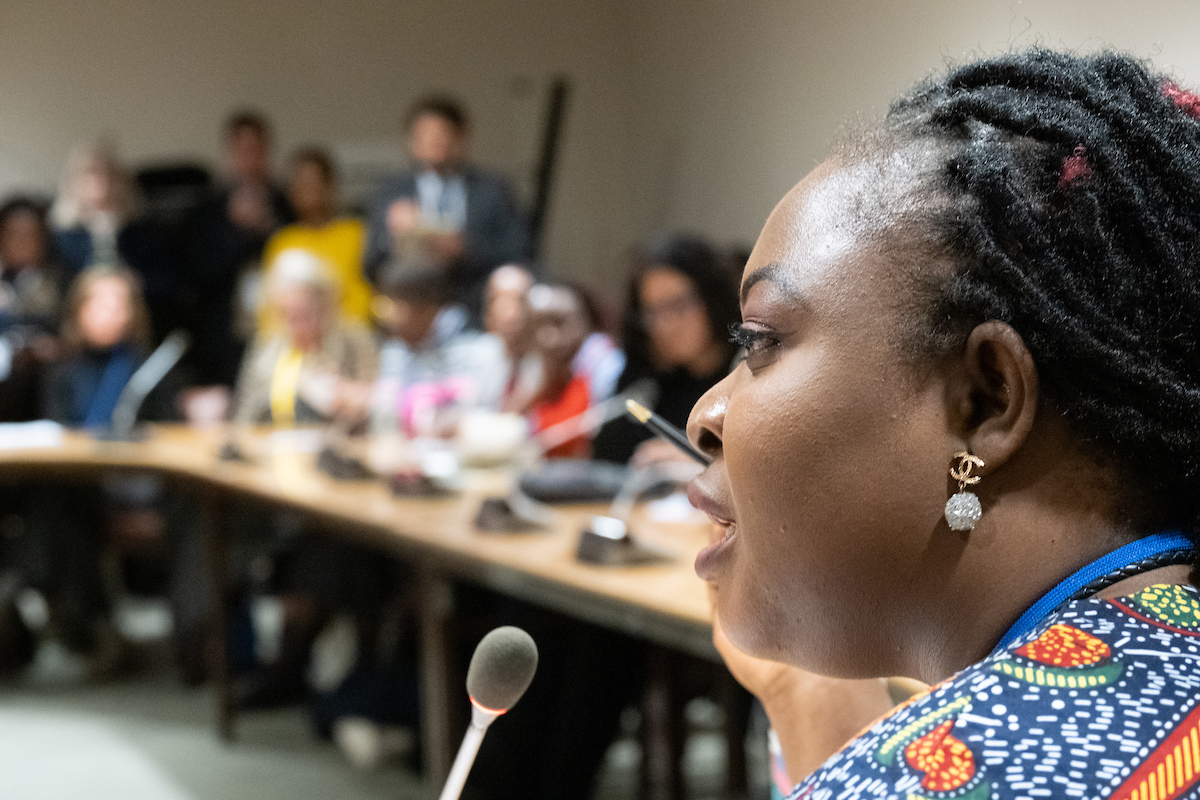The 67th UN Commission on the Status of Women, focusing on gender equality, technology and innovation, has concluded. After over 85 hours of negotiations, member states reached the so-called Agreed Conclusions, and decided on new normative language on gender equality.
The ACT Alliance Gender Justice Programme, our members, advocates and partners, joined forces, mobilised and coordinated to strategically advocate for gender justice and speak up for those voices who could not be represented in New York.
The diversity of our delegation, the National Forums, the Regional Communities of Practices, and the global membership, provided us with a constellation of perspectives and lived contexts that enriched our collective calls for action.
We made sure that our faith and rights-based voice and the experiences we have collected in decades of working in and with communities were brought to the discussion table. For these reasons, we co-hosted three Side Events with governments (Sweden, Mexico, Finland, Liberia, Denmark, and Chile) and UNFPA, two Parallel Events with faith-based actors, a Networking Event with feminist allies (including Fos Feminista, Equality Now), and a Strategy Workshop with 30 faith actors (including LWF, WCC).
Throughout CSW67, we strategized with our members (both in-person and virtually), to analyse draft texts, deliver oral statements, advocate to country missions, participate in bi-lateral meetings and amplify our collective call for gender justice.
Policy frameworks and UN agreements can feel far removed from our daily lives, but these platforms contribute to shaping our rights and realities. It is crucial that we actively participate and speak up. During the discussions at CSW about who has been hurt online, the power that AI has on restricting rights or targeting women and girls in all their diversity, and the importance of access to technology to ensure participation, we are reminded that this year’s theme raises concerns that must be addressed urgently and cannot be side-lined.
The results of the CSW negotiations are crucial to ensure that national and international advocacy efforts can continue and push for transformative change at country and community levels, to address the root causes of gender inequalities.
The following are reflections on the importance of the Agreed Conclusions from our delegates:
“To address the gender digital divide requires Member States to embark on national policy enactments, which mainstream gender and ethics, to counter the risks of having digital inequalities being the new frontier of gender inequality. As we look forward, the intentionality on inclusive language will ensure that digital innovations, including AI, are cognizant of the unique online safety and security needs of women and girls, and their participation in politics, economics and social life.”
- Gladys Nairuba, DanChurchAid & ACT Africa Gender Community of Practice, Uganda
“At CSW67, we heard how religion is being used as an argument against gender justice and reproductive health and rights. Some religious actors are claiming traditional values and are allowing themselves to be instrumentalised in a global push back against equality for women and girls in all their diversity. That’s why it’s critical for faith actors, who affirm human rights, to engage in UN processes. We welcome that the Agreed Conclusions, in the context of technology and innovation, recognise that faith-based organisations are critical stakeholders for gender equality. We must continue to mobilise our communities to reclaim religious narratives and counter backlashes on gender justice.”
- Rev. Dr. Antje Jackelén, Archbishop Emerita, Church of Sweden
“Women human rights defenders are frequently victims of digital violence in Latin America. Moving forward, we must continue to promote coordinated strategies with various actors to guarantee safe spaces. We will continue to denounce such violence, and work together to ensure women and girls receive necessary support online.”
- Laura Chacón González, LWF & ACT LAC Gender Community of Practice, Colombia
The Agreed Conclusions provide a vision and new policy framework when it comes to gendered technology and innovation. For instance, we are particularly encouraged by the inclusion of references to adolescent girls, women’s and girls’ right to privacy and the need to protect personal information as well as the strong emphasis on policy actions for the elimination and prevention of gender-based violence that occurs through or is amplified by the use of technologies. The reference to freedom of opinion and expression is another important element.
However, the push back on rights is something we need to carefully monitor and fight against. We lament the erasure of text that references ‘gender-transformative action/innovation’, ‘women and girls in all their diversity’, ‘intersectional lens’, and ‘Sexual and Reproductive Health and Rights’, including ‘comprehensive sexuality education’. References to ‘Multiple and Intersecting Forms of Discrimination’ were also minimised in the Agreed Conclusions, and there was some resistance to recognising girls as rightsholders. This means that young people who are on the frontlines of the digital revolution, and those on the margins of our societies, are further neglected.
Policy frameworks must address the lived realities of women and girls in all their diversity. The change we seek must be transformative and intersectional and we, faith actors must play a vital role in building gender-just societies and provide a fearless voice that calls for transformative courage.
We continue, together, on the road to equality.
